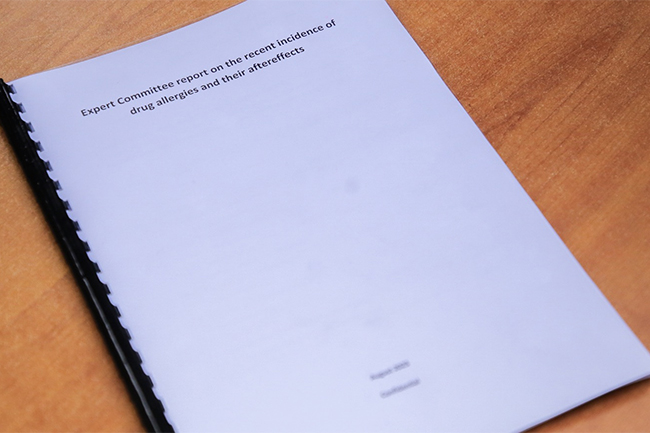Experts’ committee probing recent incidents of drug allergies submits report
August 8, 2023 09:20 pm
The committee of experts appointed to investigate the recent incidents of drug allergies and their aftereffects has handed over its report to the Ministry of Health today (Aug. 08).
The committee, chaired by the Director of the Medical Research Institute (MRI) Dr. Dedunu Dias, consisted of six members including Prof. Chandima Jeewandara, Head of the Allergy Immunology and Cell Biology Unit of Sri Jayewardenepura University.
Taking to Twitter, Health Minister Keheliya Rambukwella said the full report would not be disclosed due to doctor-patient confidentiality.
Accordingly, only the conclusion and recommendations have been made public.
The report suggests that out of the six cases analyzed in detail, five have met the criteria for anaphylaxis, which is a life-threatening allergic reaction that happens very quickly.
Among the five patients who had anaphylaxis, the causality assessment using WHO-UMC causality assessment criteria categorized four adverse drug reactions (ADRs) as probable due to the suspected drug.
The report has recommended the following:
1. Revisiting and establishing national and institutional guidelines/ protocols on anaphylaxis management/ emergency management
2. Re-emphasizing the practice of “recognize early and treat immediately with adrenalin” in anaphylaxis. Authorizing the registered nursing officers of institutions to use 1:1000 adrenalin in the IM route in an emergency without the directions of medical officers
3. Developing a mandatory continuous professional development mechanism or training programme for medical officers and nursing officers on emergency management of anaphylaxis
4. Instituting a compulsory mechanism to conduct institutional clinical audits for all life-threatening adverse incidents reported
5. Revising the TOR of DTCs to include the development of institutional drug management policies (ex: Institutional Antibiotic policy, ADR audit policy, etc.) and to introduce institutional mechanisms to minimize medication errors
6. Establishing networks or pathways for anaphylaxis survivors for subsequent allergy reviews
7. Establishing a mechanism to educate Year 10 & 11 students at schools from across the country on allergies and the safe use of medicines/antibiotics. Establishing a similar mechanism to educate media personnel and the public
8. Improving the efficiency and effectiveness of ADRs reporting and response system by introduction of real-time data-sharing mobile applications. Allowing the public to report ADRs to the NMRA.
9. Taking speedy remedial actions on procedural and/or financial issues that may hinder the adequate supply of safe and effective drugs of acceptable quality to healthcare institutions.
10. Emphasizing strict maintenance of temperature control during transportation of pharmaceuticals.
11. Stringent evaluation of the quality of medicines during registration and post-marketing quality testing of random samples is recommended to improve the quality of pharmaceuticals in the country.
12. Appropriate and expedited reporting on quality failures is needed.
Minister Keheliya said he is awaiting the results of the quality test of the drug in question after a thorough, independent examination by the National Drug Quality Control Laboratory (NDQL).
He said this is the reason he had discussed with President Ranil Wickremesinghe to set up a ‘Benchmark 4’ laboratory funded by the World Health Organization (WHO) to qualitatively expedite such queries.
Deep concerns were raised in the country about the alleged ‘substandard drug imports’ after an allergic reaction caused by an antibiotic called Ceftriaxone resulted in the death of a 21-year-old girl who was receiving treatment at the Peradeniya Teaching Hospital in July for indigestion issues.
She had shown signs of an allergic reaction after being administered the second vial of Ceftriaxone which contained a dose of 1mg. It was reported that the young woman had not shown any signs of an allergic reaction after the first dose was administered.
Days later, two other patients who were under medical care at the Kandy National Hospital too had developed allergic reactions to the antibiotic, after which the batch of the antibiotic used in the Kandy National Hospital and Peradeniya Teaching Hospital was withheld.
On July 17, Health Minister Rambukwella appointed the seven-member committee chaired by Dr. Dedunu Dias.












